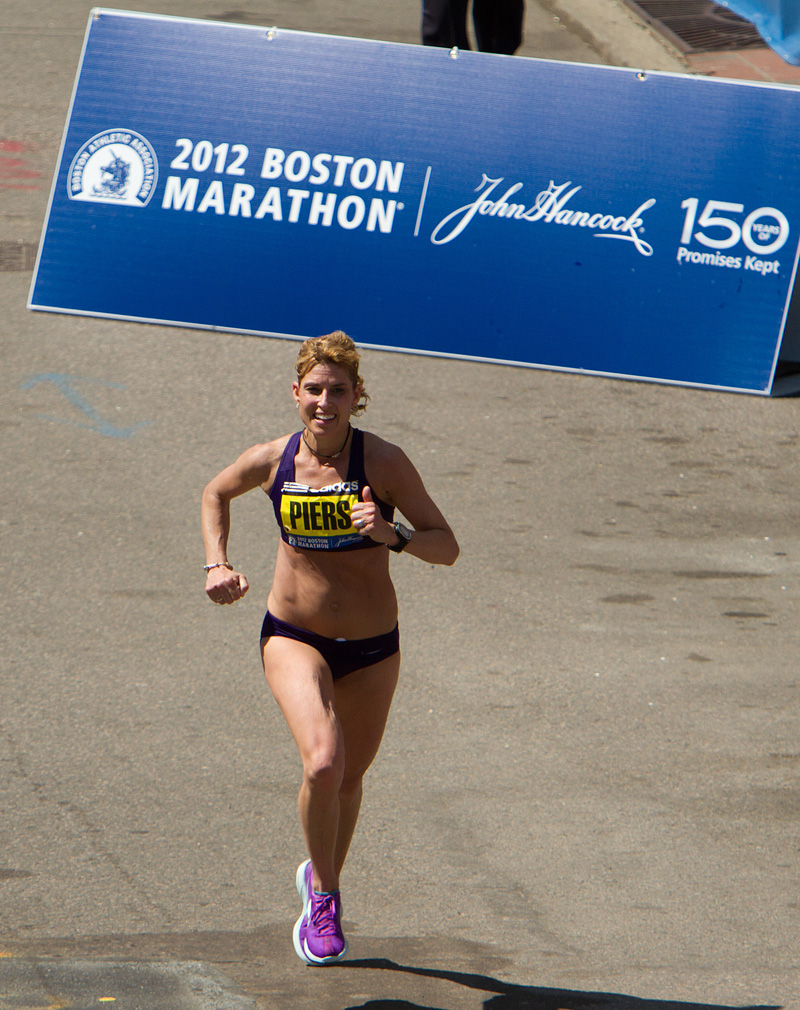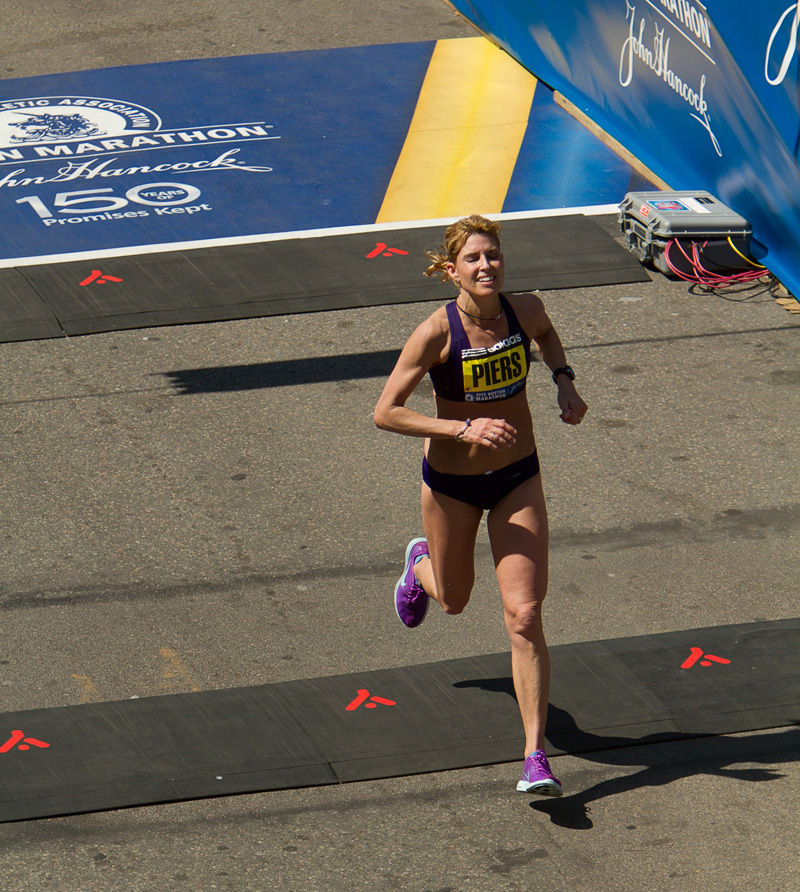Sheri Piers of Falmouth was the first American woman finisher at the Boston Marathon today. She placed 10th overall and second in the Masters division, and had an uncharacteristic smile at the finish.
Men’s Race
Wesley Korir won men’s race in a heat-slowed unofficial time of 2 hours, 12 minutes, 40 seconds. A year after Geoffrey Mutai ran the fastest marathon in history to win here, Korir won the second-slowest Boston race since 1985.
Women’s Race
Sharon Cherop won the women’s race in the Boston Marathon today, surviving hot weather and a challenge from fellow Kenyan Jemima Jelagat Sumgong to win in an unofficial 2 hours, 31 minutes, 50 seconds.
It was the fifth consecutive year that the women’s race came down to a sprint down Boylston Street.
With temperatures rising to 78 degrees by the finish, Cherop won with the slowest time in Boston since 1985. She is the third Kenyan in five years to win in Boston.
Men’s Wheelchair
BOSTON — Joshua Cassidy of Canada won the men’s wheelchair race at the Boston Marathon, comfortably beating the field in world-record time.
Cassidy, of Toronto, finished Monday in 1 hour, 18 minutes and 25 seconds, which beats the world record by two seconds.
Ernst Van Dyk of South Africa set the previous record in Boston in 2004.
The 27-year-old Cassidy led from the third mile and finished well ahead of last year’s runner-up Kurt Fearnley of Australia. Fearnley finished second in 1 hour, 21 minutes and 39 seconds.
Cassidy said once he hit the top of the course’s Heartbreak Hill, he switched the timer on his chair from distance to time and went for the record.
The race was far different from last year’s tight finish, when the top three racers finished within a second of each other.
Women’s Wheelchair
American Shirley Reilly edged Japan’s Wakako Tsuchida during a sprint to the finish line to win the women’s wheelchair division of the Boston Marathon.
Reilly finished in 1 hour 37 minutes and 36 seconds on Monday, one second ahead of defending champion Tsuchida.
Last year, Tsuchida beat Reilly by nearly seven minutes.
Reilly and Tsuchida battled throughout, with Tsuchida briefly breaking away around the 18-mile mark before Reilly closed the gap.
Diane Roy of Canada finished third, five minutes behind Tsuchida.
Earlier today
Runners left Hopkinton for the start of the Boston Marathon today with more to worry about in the 116th edition of the race than the up-and-down, 26.2-mile road to Copley Square.
Heat was already slowing the pace of the leaders and creating potentially dangerous conditions for the rest of the 27,000 registered runners. Temperatures were expected to reach the mid-80s, forcing organizers to offer a largely unprecedented deferment to the entire field that had spent the last year qualifying, registering and training for what often is a once-in-a-lifetime experience.
The wheelchair racers left Hopkinton at 9:17 under sunny skies and a temperature of 69 degrees, followed by the women’s field at 9:32. It was 73 when the elite men and the rest of the field went off at 10 a.m.; by the time they got to Boston’s Back Bay, the temperature was expected to rise into the mid-80s.
Hopkinton residents Ted and Nanda Barker-Hook have been handing out sports drinks, coffee, water, bananas, and sunscreen on the road leading to the starting gate for the past five years.
This year, no one is touching the coffee.
Recreational runners who did show up said they are prepared.
“You’ve got to know your own body,” Mike Buenting, of Minneapolis, who has run 10 marathons, said as he waited for the starting gun. “You have to know how to hydrate and the rest will take care of itself.”
The women were already off to a slow pace, with a first mile of 6 minutes, 15 seconds and a three-mile pace that would bring them in at around 2 hours, 38 minutes — the slowest Boston Marathon women’s race since 1978.
Five-gallon jugs of water — twice as many as usual, organizers said — were already lining the route early in the morning as volunteers and medical staff stood by preparing for the influx of hot and tired runners. It was not immediately known how many took them up on the offer for a deferment.
“We’re asking runners who haven’t run previously to think about tomorrow and maybe coming back next year,” Boston Mayor Tom Menino told attendees at the traditional pre-race pasta dinner at City Hall Plaza on Sunday night. “We don’t want to have any accidents out there, or anybody overtaken by the heat.”
The Boston Athletic Association also offered a limited deferment in 2010, when the Icelandic volcano eruption stalled air traffic in Europe and prevented about 300 runners from getting to Boston.
BAA co-medical director Pierre d’Hemecourt warned runners with underlying medical issues, such as a cough or a cold or a recent stomach virus that left them dehydrated: “Please don’t run the marathon on Monday.” Those who have not run a full marathon before, or who have not run in the heat, also should sit this one out, race organizers said.
“Only the fittest runners should consider running. The risks that you’ll see tomorrow are simply greater than normal,” BAA executive director Tom Grilk said, advising runners who do line up at the start to slow their pace and focus on finishing rather than having a fast time. “You should adopt the attitude that this is not a race; it is an experience.”
One year after cool temperatures and a significant tailwind — perfect running weather — helped Geoffrey Mutai finish in 2 hours, 3 minutes, 2 seconds for the fastest marathon ever, the heat has elite runners preparing for a slower pace and the recreational runners trying to figure out how to finish at all.
Forecasts called for 82 degrees at the Back Bay finish line at noon. For the recreational runners expecting to be out on the course in the afternoon, temperatures are expected to peak at 84 by 3 p.m.
Although Mutai said he has never run a hot marathon, fellow Kenyan and defending women’s champion Caroline Kilel said she was used to training in warm weather. But Kilel said the typical conditions were more like 73 degrees — hot for a marathoner, but not quite what’s expected on Monday.
“The heat affects everybody. Nobody runs fast in the heat. Nobody benefits from the heat,” 1968 winner Amby Burfoot said this weekend as the weather became the dominant topic of conversation. “If anyone’s been training in Miami, that would be great for them.”
The Boston Marathon has had its share of hot weather, with the thermometer hitting 97 degrees during the 1909 race that came to be known as “The Inferno” and the 1976 “Run for the Hoses” that started in 100-degree heat and finished with spectators sprinkling winner Jack Fultz with garden hoses to cool him down.
“It’s just the worst thing a marathoner can face,” said Burfoot, who ran with Fultz for half of the ’76 race before fading in the heat. “I hate that the marathon is such a crapshoot. You train for 4-6 months, and the only thing that matters is the weather.”
The last on-course death of a Boston Marathon participant occurred in 2002, but the Chicago Marathon stopped its 2007 race after 3½ hours when a runner died after temperatures climbed to 88 degrees.
Send questions/comments to the editors.




Success. Please wait for the page to reload. If the page does not reload within 5 seconds, please refresh the page.
Enter your email and password to access comments.
Hi, to comment on stories you must . This profile is in addition to your subscription and website login.
Already have a commenting profile? .
Invalid username/password.
Please check your email to confirm and complete your registration.
Only subscribers are eligible to post comments. Please subscribe or login first for digital access. Here’s why.
Use the form below to reset your password. When you've submitted your account email, we will send an email with a reset code.